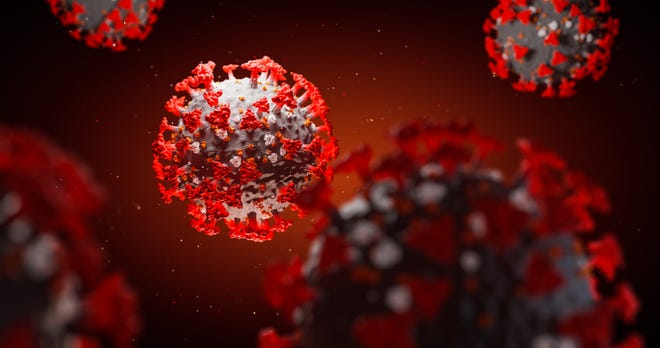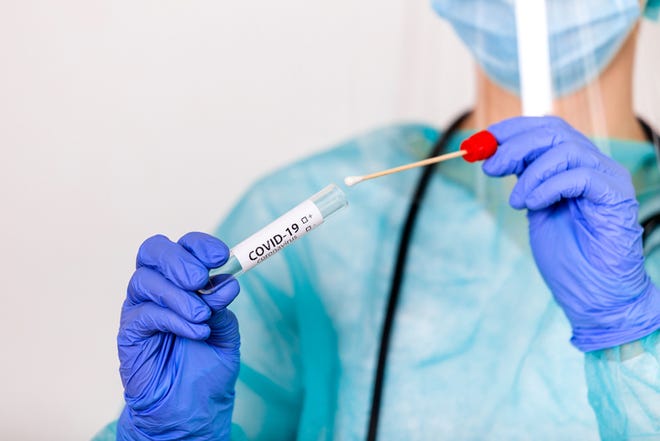Woman who died after transplant got COVID-19 from donated lungs
A woman who died after undergoing a double lung transplant at the University of Michigan Medical School in Ann Arbor is the first known person to contract COVID-19 from donor lungs, according to a new case report published in the American Journal of Transplantation.
“To my knowledge, this is the first, and actually the only, documented transmission of COVID-19 to a recipient” from donated organs, said Bruce Nicely, chief clinical officer of Gift of Life Michigan, the state’s federally designated organ and tissue recovery program.
The case is rare, and represents “the worst-possible scenario” to play out in a pandemic that has killed half a million Americans, Nicely said, noting, however, that Gift of Life Michigan was not involved in this donation. The transplant occurred in late October and the donor was from out of state.

The woman who underwent the double lung transplant had chronic obstructive pulmonary disease, and tested negative for coronavirus using a rapid polymerase chain reaction (PCR) test 12 hours prior to surgery, the case report details.
The organ donor, a woman from the Upper Midwest who suffered brain death following an auto accident, also had a negative PCR test using a nasopharyngeal swab within 48 hours of when her organs were procured.
The donor’s family reported that she had no known history of travel and didn’t have any recent COVID-19 symptoms. It was unclear whether the organ donor had exposure to a person infected with the virus.
“By definition, that donor was asymptomatic,” said Dr. Daniel Kaul, who is the director of the Transplant Infectious Disease Service at the University Michigan and was among the study authors. “But it’s important to recognize the donor was tested with a standard PCR and was negative, and that test was repeated on that same specimen, and was negative again.
“In most asymptomatic carriers, the vast majority — greater than 90% — would test positive.”
A day after the transplant, the recipient’s heart wasn’t pumping as efficiently as expected, and two days after the transplant, she developed a fever, low blood pressure and respiratory distress.
Doctors collected samples of fluid from her lungs using what’s known as a bronchoalveolar lavage, and tested that fluid for SARS-CoV-2. The results were positive.

More:COVID-19 vaccine shipments to Michigan delayed due to winter storms
More:Answers to your questions about COVID-19 vaccines
More:Vaccinating Michigan: Tracking the progress of the state’s COVID-19 vaccine rollout
The same type of fluid from the organ donor was then also tested for coronavirus, and also yielded a positive result.
Soon after, a thoracic surgeon who performed the transplant surgery also tested positive for the virus. Whole genome sequencing of all three people showed that the disease likely originated in the organ donor, and spread to the recipient and the surgeon during transplantation.
The woman who had the double lung transplant was treated for COVID-19 in the hospital, and was given the anti-viral medicine Remdesivir and convalescent plasma, as well as steroids, but her condition worsened. She died about two months after her transplant surgery.
The case poses a dilemma for transplant doctors: People who need organ transplants are at high risk for dying without them, but there’s no way to definitively prove an organ donor might not be carrying a disease like COVID-19.
“You can’t 100% prove that someone doesn’t have something because we don’t have perfect tests,” Kaul said. “So we try and put together a combination of their exposures, their clinical history, testing, radiology like a CT-scan of the lung of the donor, which was done and didn’t show anything that looked like COVID.
“We do all those things and say, ‘Well, as best we can determine, this donor is safe to use.’ But unfortunately in this case, there was asymptomatic COVID that was not detected by the standard testing.”
Kaul suggested that organ procurement organizations should use lung fluid specimens to test for COVID-19 prior to transplant. Nicely of Gift of Life Michigan said Monday that the organization is in the process of making that standard procedure for lung donations.
In this case, no other organs from the donor were used for transplant.
The study’s authors cautioned that this case can’t be used to suggest there is a risk of coronavirus infection when other organs, such as kidneys, the liver, heart or pancreas, may pose in transplantation.
“Back in the spring, the number of transplants in highly affected areas like southeastern Michigan really fell off dramatically,” Kaul said.
There were concerns about whether transplants could be done safely when the virus was so widespread, he said, and about whether hospitals had the staffing and resources to do transplants when they were flooded with critically ill COVID-19 patients.
“Part of it was concern about what would happen to someone immediately post-transplant who might get COVID and how best to screen donors,” he said.
“I have no doubt that there have been other donors who had COVID whose organs were used but the recipients didn’t get ill, and that may be because organs other than the lungs were used. It’s possible that there have been other cases where there has been transmission and bad outcomes, but it wasn’t obvious and no one tested for it.”
This case, he said, is incredibly rare.
“I don’t think that people who have organ failure who need organ transplants should be afraid of getting COVID with the organ transplant,” Kaul said. “That’s the good news and if you have organ failure, there’s a lot of bad things that can happen to you from that. … For the vast majority of people, the risk of declining an organ when it’s offered is far greater than the risk of donor transmission of this virus or other infections that we try and find, but can’t always.”
Nicely said a death like this one following transplant is doubly devastating.
“Our hearts go out to the recipient’s family as well as the donor’s family,” Nicely said. “If the recipient of donated organs dies, it’s sometimes kind of a double tragedy for the donor family, too.
“That case represented certainly one of the huge challenges for donation and transplantation in the age of a pandemic. There’s testing, and there’s the fact that those 110,000 or so people on the waiting list don’t get a respite to their end-stage organ disease. It does not take a pause just because there’s a pandemic. Their disease continues to take its toll. They remain on the waiting list.

“Donation does save lives,” he said. “It really does matter. So, despite a pandemic. The need and the possibility to do good remain.”
Contact Kristen Shamus: kshamus@freepress.com. Follow her on Twitter @kristenshamus.
The post Woman who died after transplant got COVID-19 from donated lungs appeared first on Chop News.
from Chop News https://ift.tt/2ZCTLYa
Post a Comment